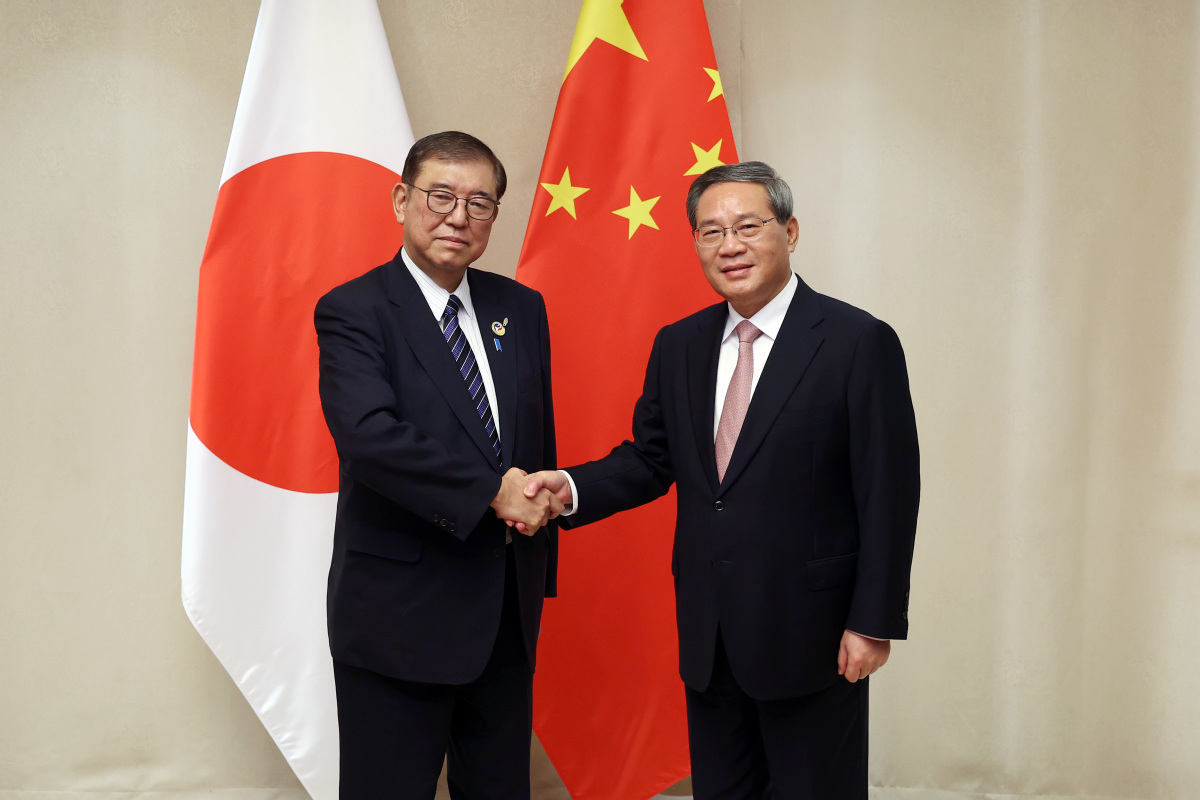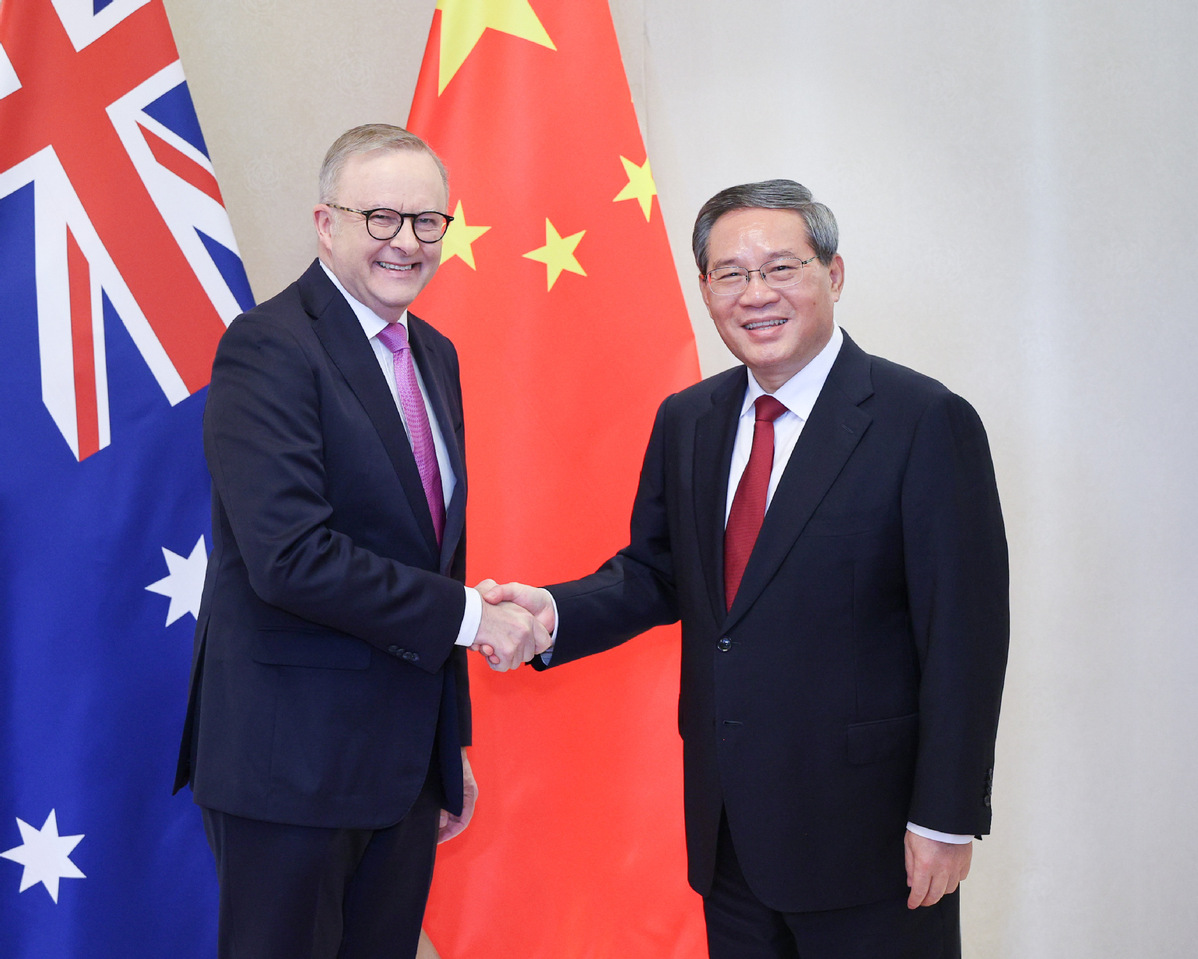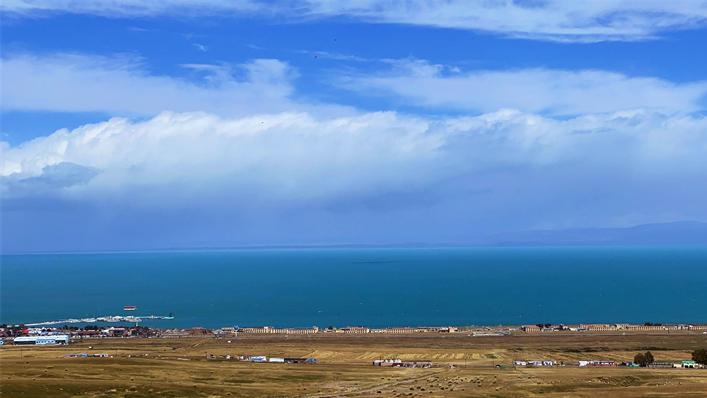Stable, mature bilateral ties urged at meet

Premier Li Qiang (right) meets with Japanese Prime Minister Shigeru Ishiba in Vientiane, Laos, Oct 10, 2024. (Photo by Wang Zhuangfei/chinadaily.com.cn)
Premier Li Qiang and Japanese Prime Minister Shigeru Ishiba reaffirmed on Thursday their commitment to comprehensively advancing the strategic and mutually beneficial relations between China and Japan.
During their talks in Vientiane, Laos, on the sidelines of the leaders' meetings on East Asia cooperation, they agreed that both countries should strive to jointly build a constructive and stable China-Japan relationship that meets the demands of the new era.
This was the first meeting between Li and Ishiba since the new Japanese prime minister took office earlier this month.
Li emphasized that the development of China and Japan is an important opportunity for each other, not a challenge.
He urged Japan to stay committed to the principles and consensuses stipulated in the four political documents between the two nations, and work together with China to set the right course for the development of bilateral ties and uphold the political foundation of their relations.
China is ready to work with Japan to further leverage their respective comparative advantages, explore more new growth drivers of cooperation, and jointly safeguard the stability and smooth flow of industrial and supply chains as well as the global free trade system, Li said.
He underlined the need for both sides to increase support for exchanges in subnational, cultural, sports, youth, and other fields to enhance mutual understanding and friendship between the two peoples.
China is willing to strengthen multilateral coordination and cooperation with Japan to jointly promote regional peace, stability, and prosperity, Li added.
Ishiba said that Japan is willing to work with China to look to the future and promote the steady development of bilateral ties. Japan has no intention of decoupling from or cutting supply chains with China, and wants to deepen pragmatic cooperation in various fields, he said.
Ishiba assured the Chinese premier that Japan adheres to its position on the Taiwan question as stated in the Japan-China Joint Statement signed in 1972, which remains unchanged.

Premier Li Qiang (right) meets with Australian Prime Minister Anthony Albanese in Vientiane, Laos, Oct 10, 2024. (Photo/Xinhua)
On Thursday, Li also met with Australian Prime Minister Anthony Albanese in Vientiane. They both acknowledged the steady improvement in China-Australia ties, and expressed the countries' commitment to jointly safeguard peace and stability in the Asia-Pacific region.
Li said that China is willing to further enhance mutual understanding with Australia and continue to work hand in hand to build a more mature, stable, and fruitful comprehensive strategic partnership.
Noting that Sino-Australian relations are essentially characterized by mutual benefit and win-win results, he said that China is ready to share development opportunities with Australia.
Li expressed Beijing's readiness to continue to strengthen exchanges with Canberra on macroeconomic policies, and expand cooperation in trade and investment, green development, scientific and technological innovation, and other fields, in order to boost bilateral ties.
He highlighted that a peaceful, stable, and prosperous Asia-Pacific serves the common interests of China, Australia, and other countries in the region.
China has been Australia's largest trading partner for 15 consecutive years, with bilateral trade reaching around $230 billion last year.
Bilateral relations were severely damaged in the past due to the negative China policies adopted by the previous Australian government. The two countries broke the ice in 2022 when Albanese took office.
Albanese told Li that his country is willing to further strengthen high-level dialogue and cooperation with China in various fields, and engage in candid communication.
Australia adheres to the one-China policy, and is willing to strengthen coordination with China, he added.
Photos
Related Stories
- Chinese premier hails recent progress in China-Australia ties
- China to work with Australia to safeguard peace, stability in Asia-Pacific region: Premier Li
- Chinese premier says development of China, Japan key opportunity for each other, not challenge
- Chinese premier says China ready to share more development opportunities with Australia
- China to build first-class business environment: Premier Li
Copyright © 2024 People's Daily Online. All Rights Reserved.









